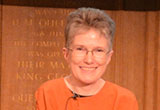 Our global community has made great strides with issues of race and gender, but has a way to go before disabled people of all ages are warmly welcomed, respected, and fully included as equals in all aspects of our societies, including as equal recipients of high quality healthcare. Do we all, as doctors, nurses, and other health professionals, really understand the perspectives of disabled people and their families? Do we recognise the challenges and barriers that they face as they go about their daily lives and access services? Do we offer the same quality of healthcare with the same outcome opportunities as for those who are not disabled? Do we take the time to listen to disabled people and their families, to really hear what matters most to them?
Our global community has made great strides with issues of race and gender, but has a way to go before disabled people of all ages are warmly welcomed, respected, and fully included as equals in all aspects of our societies, including as equal recipients of high quality healthcare. Do we all, as doctors, nurses, and other health professionals, really understand the perspectives of disabled people and their families? Do we recognise the challenges and barriers that they face as they go about their daily lives and access services? Do we offer the same quality of healthcare with the same outcome opportunities as for those who are not disabled? Do we take the time to listen to disabled people and their families, to really hear what matters most to them?
In 2011, the BBC Panorama team captured on camera the horrific abuse of people with learning disabilities and autism living in Winterbourne View Hospital in the south of England. This was broadcast for all to see. Hands were held up in horror. A number of national reviews were immediately commissioned to investigate how this had come about, whether people with learning disabilities were at risk of premature death, and to make recommendations for care and safeguards for the future, towards improving their life-chances and experiences. [1-3] Disabled peoples’ predicaments were made more visible in UK society. Those in other countries will know whether this resonates (or not).
One of the outcomes of the Winterbourne View review programme was funding by the Department of Health (England) of Disability Matters: www.disabilitymatters.org.uk. This is a suite of freely available resources, including e-Learning and face-to-face group training materials, which aspire to challenge and positively change the attitudes of everyone who may work with disabled children and young people across all workforce and volunteer sectors.
Disability Matters has been co-produced with disabled children, young people, parent carers, and other experts in the field, a collaboration that has been an incredible journey. Passion, determination, and openness has enriched the discussions in the author and editorial “huddles” where everyone has had a voice, all views have been carefully considered, reflected on and melded to underpin each 20-30 minute session of e-Learning. No pedestals were permitted—everyone was equal, valued, and included, in line with the key messaging of the programme.
The resources are engaging and interactive, filled with real stories of the experiences of disabled children, young people, and their families in 21st century Britain, with positive tips about how others can more meaningfully empower and support them. There is something for everyone in Disability Matters. Specific sessions relate to disabled people of all ages, demythologising the Mental Capacity Act, best interests decision-making, deprivation of liberty safeguards and advance care planning, making these complex legalities accessible for everyone. Issues as diverse as confidence, advocacy, rights, feelings, working together, pain, worry, and anxiety—57 individual sessions in all—were carefully chosen after extensive consultation with organisations and employers across health, education, social care, criminal justice, travel, leisure, sport and tourism, community, and faith groups and most importantly, with disabled children, young people, and parent carers themselves, ensuring that the issues that matter most to them are included.
Disability Matters aims to empower all who access its resources to proactively look out for the challenges and barriers that disabled people face, then to use their imaginations creatively to work with disabled people to overcome them.
Positive, can-do attitudes cost nothing, but can make the world of difference that really matters. If you dip into Disability Matters, you will hear the views and voices of disabled people and their families as well as benefiting from the experience of a range of experts in the field. You will be able to reflect on your own practice and will hopefully be able to improve the quality and equality of healthcare that you deliver for disabled people. If we are to change our society’s attitude towards disabled people, we all as individuals have a responsibility to first examine and improve our own attitudes. We should encourage our organisations and those in our networks to embed Disability Matters as an essential component of reflective learning. Are you up for the Disability Matters challenge? Will you champion the equal right to the best outcomes for everyone?
Competing interests: I am clinical lead for the Disability Matters programme, for which my Trust gets paid for my time.
Karen Horridge is a disability paediatrician in Sunderland, course director for the MSc in Paediatric Neurodisability, Sheffield Hallam University, chair of the North of England Collaborative Cerebral Palsy Survey, chair of the British Academy of Childhood Disability and clinical lead for Disability Matters.
References:
1. Flynn M. Winterbourne View Hospital. A Serious Case Review. South Gloucestershire safeguarding Adults Board. 2012
2. Transforming care: A national response to Winterbourne View Hospital. Department of Health Review: Final Report. 2012.
3. http://www.bild.org.uk/news-and-whats-on/winterbourne-view/
4. Confidential Inquiry into the Premature deaths of People with Learning Disabilities (CIPOLD). 2012.
